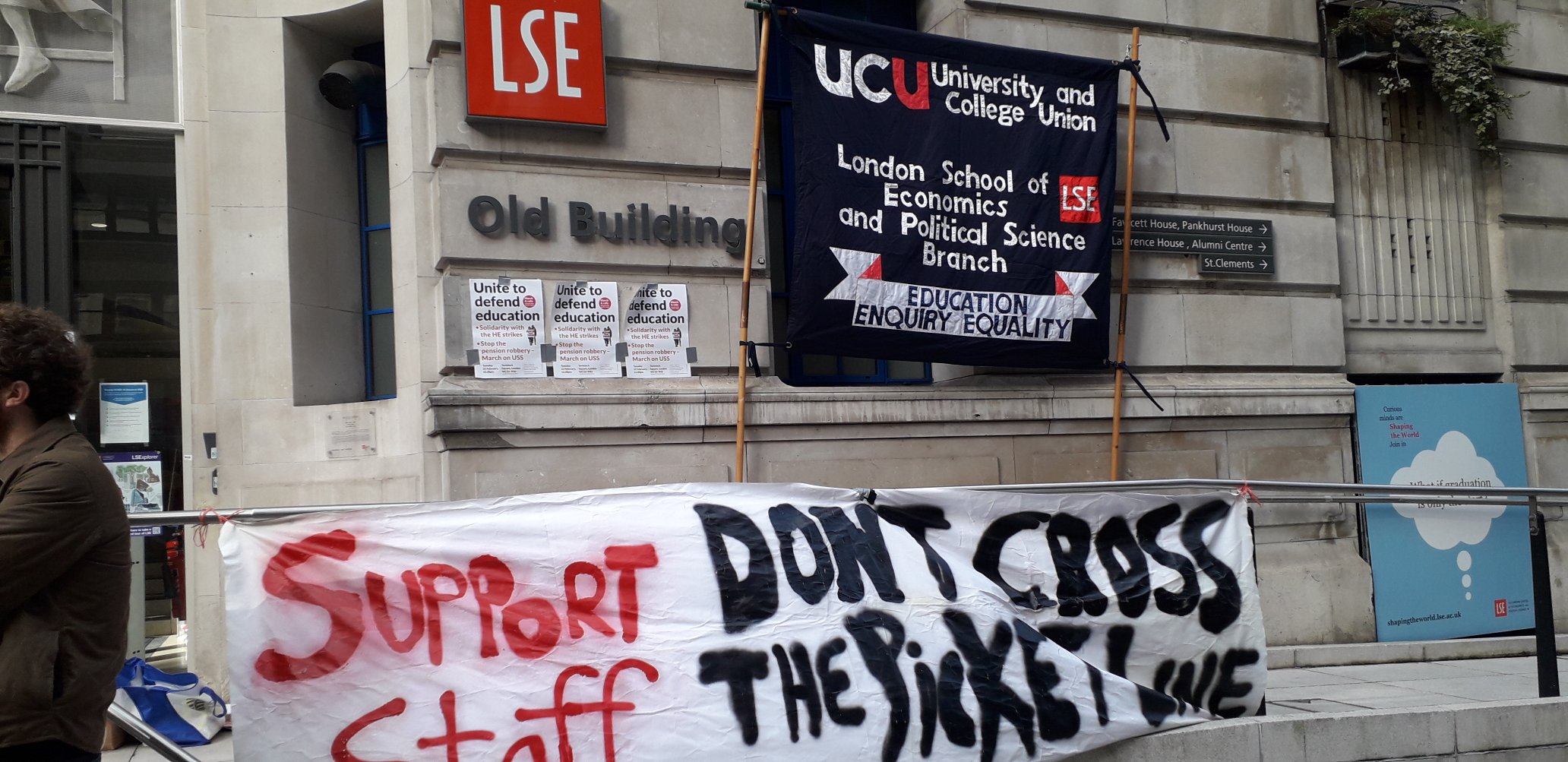Jack Calland and Marta Perich Pallaruelo tell us why 100+ ID students sent an open letter to the LSE Directorate announcing a fee strike in response to lost teaching time.
On Friday, 18 March, postgraduate students from the Department of International Development (ID) sent an open letter to the LSE Directorate announcing a fee strike in response to lost teaching time resulting from failures to meet the demands of striking LSE University and College Union (UCU) staff. Over 100 students have so far signed the letter committing to withhold their next fee instalment due on 28 April, or demanding a refund for those who have already paid.
We decided to organise this action after more strike action was confirmed for this week, the final week of Lent Term, meaning yet another round of teaching being lost. In our short time at the LSE, we are losing 4 out of 20 weeks of teaching – 20 percent. This is unacceptable given the already extremely high fees expected of us. In our view, the blame for these disruptions lies squarely at the feet of LSE leadership, as they are ultimately responsible for disruptions to our learning.
The decision by UCU staff to embark on another week of strike action was reluctant but necessary in the face of no attempt by university employers to meet their entirely reasonable demands and put an end to the loss of teaching time that ultimately harms students most. University staff are facing an unacceptable pension cut of 35%, a real-term pay decline of 26% since 2009, pay inequality, and exploitative and insecure contracts, despite mounting workloads. LSE and other university leadership are fully aware of the demands of the UCU and what would be required to bring an end to the strike – it is little more than a return to the negotiating table that is required. In our letter, we told the LSE Directorate that we cannot be expected to pay full fees on such a significantly reduced academic programme if they continue to avoid the path of resolution.
University degrees in the United Kingdom are the most expensive in the world according to the OECD. Even before strike disruptions, this is extortionate, especially if they do not contribute to ensuring academic staff are paid fairly. But in the face of a reduced academic programme and no respect for the perfectly reasonable demands striking staff, they are beyond the pale.
Expensive fees and reduced public funding for universities underpins the shift towards the ‘neoliberal university’. LSE leadership appears unwilling to do anything to deviate from its descent into a marketised, corporatised university in which students are treated as consumers and staff are casualised, all in the interest of the bottom line. But managerial staff at the top earn huge and rising salaries – LSE Director Minouche Shafik raked in £507,000 in 2021. By withholding fees due to lost class time, students are simply following the same consumerist logic: as consumers, we aren’t getting what we’re paying for.
But buying into the representation of students as consumers would be a capitulation. Instead, students withholding fees are opting for collective solidarity with striking staff. Meeting the demands of the UCU would end the fee strike, even though students won’t get lost teaching time back. Of course, if the demands of the UCU continue to be ignored, then students cannot be expected to pay full fees on a significantly reduced academic programme while staff are not fairly treated and compensated. Plus, the LSE is saving on the unpaid wages of striking staff.
Withholding fees carries the risk of restrictions being placed on striking students. These include withholding assessment results, reference letters, and degree certifications. Thankfully, ID professors have already told us that they would not comply with any “silly” attempts to prevent them from writing references for deserving students. Prospective employers have also indicated understanding of the disruption students have faced during this academic year, and would not let a delay in final marks or degree certifications dissuade them from hiring. And as more and more external moderators resign and staff withdraw their labour from marking, it would not be surprising if results and degrees are delayed in any case – particularly with the growing prospect of even more industrial action during the summer. The threat of restrictions therefore does not stand up to the risks the school faces by losing out on potentially millions of pounds of lost fees.
The logic of fee strikes is likely to appeal to students in other LSE departments and other universities (there is already movement in this respect at Goldsmiths, UCL, and others). The LSE Directorate should do everything in its power to end the union dispute, mitigate impacts on students, and bring the academic year to a peaceful close. But until then, we students will continue, as ever, to stand in solidarity with our staff.
The views expressed in this post are those of the author and in no way reflect those of the International Development LSE blog or the London School of Economics and Political Science.
Image credit: Tiziana Leone on Twitter






I support the fee strike. It’s really ridiculous to have a month off with such a high amount of money paid. I suggest the school consider it seriously that this may have a very negative effects on school’s fame and reputation. We are paid to be the loser of the conflicts between the school and the teachers. We can understand the strike by the teachers but we have no responsibility to pay for that.